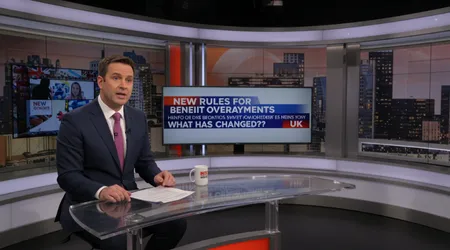New Rules for Benefit Overpayments: What Has Changed?

The new rules for benefit overpayments in the UK have sparked heated debate, reshaping how the Department for Work and Pensions (DWP) tackles welfare system errors.
Introduced in 2025, these reforms aim to curb fraud and errors, which cost taxpayers £9.5 billion last year, according to a DWP report. But what do these changes mean for claimants?
Are they a fair crackdown or a bureaucratic burden? This article dives into the updated policies, their impact, and what claimants must know to navigate this shifting landscape.
From bank account monitoring to tightened eligibility, the stakes are high, and clarity is essential.
The welfare system, a lifeline for nearly 24 million people, is under scrutiny. Fraud and error, particularly in Personal Independence Payment (PIP), surged to £330 million in 2024.
The new rules for benefit overpayments seek to address this, but critics argue they risk penalizing honest claimants.
This piece explores the reforms, their implications, and practical steps for compliance, offering a clear guide through the complexities.
Why the New Rules for Benefit Overpayments Were Introduced
Fraud and error in welfare payments have long plagued the system. The DWP’s 2024 report highlighted £9.5 billion in overpayments, down slightly from £9.7 billion.
The new rules for benefit overpayments aim to recover these funds through stricter monitoring. Rising disability claims, now at 4 million, drive the urgency for reform.
The government’s Fraud, Error and Debt Bill, introduced in 2025, underpins these changes. It empowers the DWP to work with banks to flag eligibility issues.
++ Who Qualifies for the New Energy Support Scheme in the UK?
For example, exceeding the £16,000 Universal Credit threshold triggers investigations. This proactive approach aims to prevent overpayments before they spiral.
Yet, the reforms aren’t just about numbers. They reflect a broader push to modernize welfare, ensuring fairness while curbing misuse.
Critics, however, warn of overreach, citing privacy concerns. The balance between efficiency and empathy remains a contentious issue.

How Bank Account Monitoring Works
Banks now play a pivotal role in the new rules for benefit overpayments. The DWP collaborates with financial institutions to monitor accounts for eligibility breaches.
If savings exceed thresholds, like £16,000 for Universal Credit, banks flag accounts for review.
This isn’t about spying, as clarified by DWP’s Mr. Western in 2024. Banks share limited data to verify eligibility, not spending habits.
Still, claimants like Sarah, a single mother, worry about intrusive oversight. Her savings briefly exceeded the limit, triggering a review.
The process aims to catch errors early. For instance, undeclared income led to a £2,000 overpayment for John, a PIP claimant.
Also read: How the Cost of Living Payments Are Changing This Year
The new rules for benefit overpayments seek to prevent such cases, but claimants must stay vigilant.
Monitoring extends to regular account checks, especially for means-tested benefits. Claimants must report changes promptly to avoid penalties.
The system prioritizes prevention, but errors can still slip through, complicating recovery.
Privacy concerns linger, with campaigners arguing it erodes trust. The DWP insists safeguards are in place, but public skepticism persists. Clear communication is vital to ease fears and ensure compliance.
Changes to Eligibility and Reporting Requirements
Eligibility rules have tightened under the new rules for benefit overpayments. Means-tested benefits like Universal Credit now face stricter income thresholds. Claimants must report changes in circumstances, like new jobs, within days.
Failure to report can lead to overpayments, recoverable through deductions. For example, a claimant earning £500 extra monthly risks losing benefits if unreported. The new rules for benefit overpayments emphasize timely updates to prevent debt.
The DWP has introduced rigorous checks for personal detail changes, like bank accounts. This aims to reduce claimant errors, which contribute significantly to overpayments. Accuracy is now non-negotiable.
Read more: Universal Credit 2025: What’s New in the Latest Update
For PIP claimants, reassessments are more frequent. The new rules for benefit overpayments prioritize verifying ongoing eligibility, especially for health-related claims.
This can feel daunting for disabled claimants like Emma, who faced unexpected reviews.
The system also encourages proactive communication. Claimants must notify work coaches of travel plans or income shifts. This reduces overpayment risks but adds administrative burdens for many.
Impact on Claimants: A Double-Edged Sword
The new rules for benefit overpayments aim to save £4.7 billion by 2029/30, per the Institute for Fiscal Studies.
Yet, they risk pushing 150,000 into poverty. Reduced health top-ups for Universal Credit, from £97 to £50 weekly by 2026, hit hard.
For claimants like Tom, a disabled worker, lower payments threaten financial stability. He relies on PIP for mobility aids, now under tighter scrutiny. The new rules for benefit overpayments feel punitive to him.
Conversely, the rules protect taxpayers by recovering debts. Overpayments, often from claimant errors, burden the system. The DWP’s focus on prevention aims to ensure fairness across the board.
Yet, the human cost is undeniable. Disability campaigners call the reforms a “clear attack” on vulnerable groups. The balance between fiscal responsibility and compassion remains elusive.
The Right to Try Guarantee, introduced in 2025, offers hope. It allows disabled claimants to try work without immediate benefit loss, encouraging economic independence.
Practical Steps for Claimants to Stay Compliant
Navigating the new rules for benefit overpayments requires vigilance. Claimants must report changes in income, savings, or circumstances promptly. Delays can trigger costly deductions.
Regularly check eligibility criteria, especially for means-tested benefits. Use DWP’s online tools to track thresholds, like the £16,000 Universal Credit limit. Staying informed prevents surprises.
For example, Lisa, a Universal Credit claimant, avoided overpayments by updating her work hours weekly. Proactive communication with her work coach saved her stress.
Keep records of all correspondence with the DWP. This helps resolve disputes over alleged overpayments. Documentation is a claimant’s best defense.
Seek advice from organizations like Citizens Advice. They offer free guidance on navigating the new rules for benefit overpayments, ensuring claimants stay compliant.
| Aspect of New Rules | Details | Impact on Claimants |
|---|---|---|
| Bank Monitoring | Banks flag savings over £16,000 | Risk of benefit suspension |
| Reporting Requirements | Immediate updates on income changes | Prevents overpayment debts |
| PIP Reassessments | More frequent eligibility checks | Increased administrative burden |
| Health Top-Up Cuts | Reduced from £97 to £50 by 2026 | Financial strain for claimants |
The Bigger Picture: Balancing Fairness and Efficiency
The new rules for benefit overpayments reflect a broader push for welfare reform. Spending on disability benefits is projected to hit £70 billion by 2030. Without changes, costs could spiral further.
Yet, the reforms spark ethical questions. Is it fair to monitor bank accounts when claimants already face financial strain? The DWP argues it’s about protecting public funds, but trust is fragile.
Analogously, it’s like tightening a ship’s sails in a storm necessary for stability but risky if overdone. Claimants, already battered by economic waves, need support, not suspicion.
The government’s concessions, like the Right to Try Guarantee, show responsiveness. Yet, 50 Labour MPs still oppose the reforms, signaling deep divisions. Public trust hinges on transparency.
Ultimately, the new rules for benefit overpayments must balance fiscal discipline with human dignity. Claimants deserve clarity and fairness, not just stricter oversight.
FAQs: Your Questions Answered
1. What happens if I don’t report a change in circumstances?
Failure to report changes, like new income, can lead to overpayments. The DWP may deduct these from future benefits, causing financial strain.
2. Can the DWP access my bank account details?
No, the DWP only receives limited data from banks to verify eligibility, not full access to spending habits, as clarified in 2024.
3. How can I avoid overpayments?
Report changes promptly, keep records, and check eligibility regularly. Use DWP tools or seek advice from organizations like Citizens Advice.
4. Will the new rules affect my current benefits?
Existing claims may face reassessments, especially for PIP. Health top-ups for Universal Credit will decrease for new claimants by 2026.
In conclusion, the new rules for benefit overpayments mark a pivotal shift in UK welfare policy. They aim to save billions while curbing fraud, but at what cost?
Claimants face tighter scrutiny, reduced payments, and administrative hurdles. While the DWP’s intent is to protect public funds, the human impact 150,000 potentially pushed into poverty demands attention.
By staying informed, reporting changes, and seeking support, claimants can navigate these changes.
The system’s fairness depends on balancing efficiency with empathy. Will these reforms strengthen welfare or fracture trust? Only time will tell.
